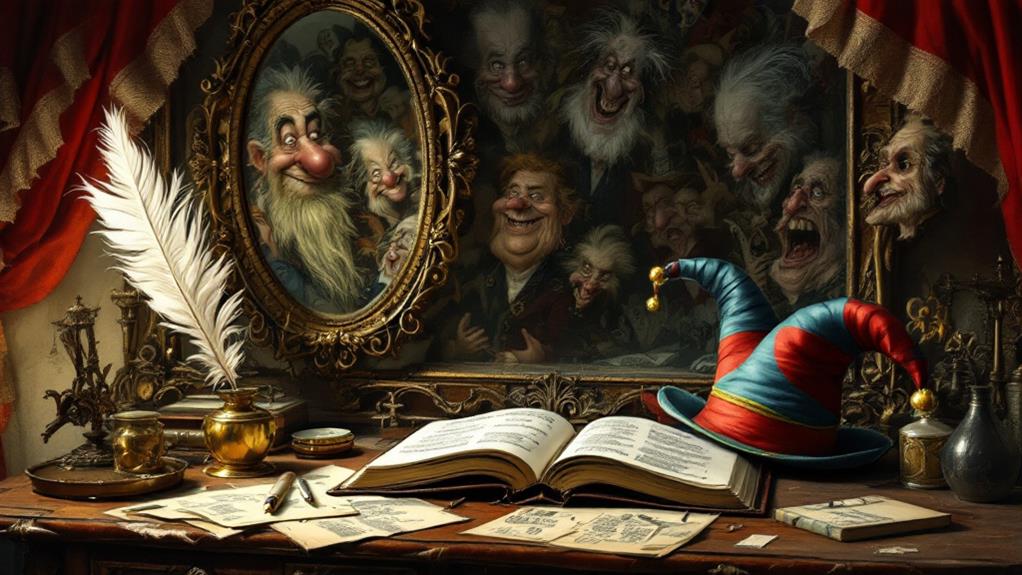What Are the Three Types of Greek Comedy?
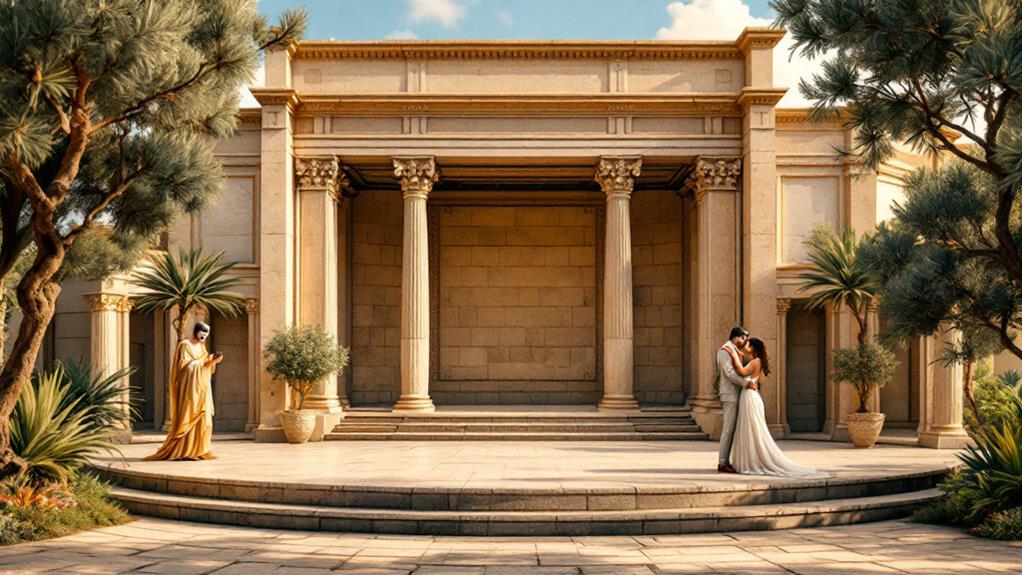
Greek comedy evolved through three distinct types: Old, Middle, and New Comedy. Old Comedy, exemplified by Aristophanes, featured biting political satire and large choruses. Middle Comedy marked a shift, moving away from overt political commentary and focusing on contemporary life with stock characters. New Comedy, represented by Menander, centered on everyday situations and relatable characters, often involving romantic plots. Each type reflected the changing social and political environment of ancient Greece. While the styles differed, all three forms used humor to offer social commentary and critique. Exploring these comedic forms can reveal much about ancient Greek society and its values.
Origins of Greek Comedy
In the heart of ancient Athens, Greek comedy blossomed during the 5th century BCE, rooted in the lively Dionysian festivals. These celebrations, dedicated to the god Dionysus, served as the perfect backdrop for the emergence of this vibrant form of theatre. As you investigate the origins of Greek comedy, you'll uncover that it quickly became an integral part of Ancient Greek drama, alongside tragedy.
The comedic plays of this era weren't just for laughs; they often incorporated biting political satire and astute social commentary. Playwrights like Aristophanes used their wit to critique contemporary issues and lampoon public figures. The comedies featured exaggerated characters and situations drawn from everyday life, making them relatable and entertaining for the audience.
Greek comedy set itself apart with distinctive elements such as the use of masks, over-the-top costumes, and choral performances. These features helped create a unique theatrical experience that enthralled audiences. As the art form evolved throughout the century, it laid the foundation for future comedic traditions and influenced theatre for generations to come.
Old Comedy: Political Satire
Razor-sharp wit and unabashed mockery defined Old Comedy, the earliest form of Greek comic drama. You'd find pungent political satire and biting social commentary at the heart of these plays, as ancient Greeks reveled in the audacious humor of playwrights like Aristophanes. His surviving works, including Lysistrata, Birds, and Frogs, exemplify the exaggerated style and scathing critiques that characterized Old Comedy.
When you watched an Old Comedy performance, you'd witness plots revolving around a "happy idea" that characters enthusiastically adopted by the play's end. The chorus played a vital role, offering commentary, song, and dance to complement the satirical action on stage. You'd be struck by the bold personal attacks on real-life public figures and the unrestrained exploration of bodily pleasures.
Old Comedy thrived during the 5th century BCE but met its demise with the conclusion of the Peloponnesian War in 404 BCE. This marked the transformation to Middle Comedy, which shifted focus from political satire to more general social themes. The legacy of Old Comedy's fearless approach to critiquing power and society continues to influence satirical works today.
Middle Comedy: Transition Period
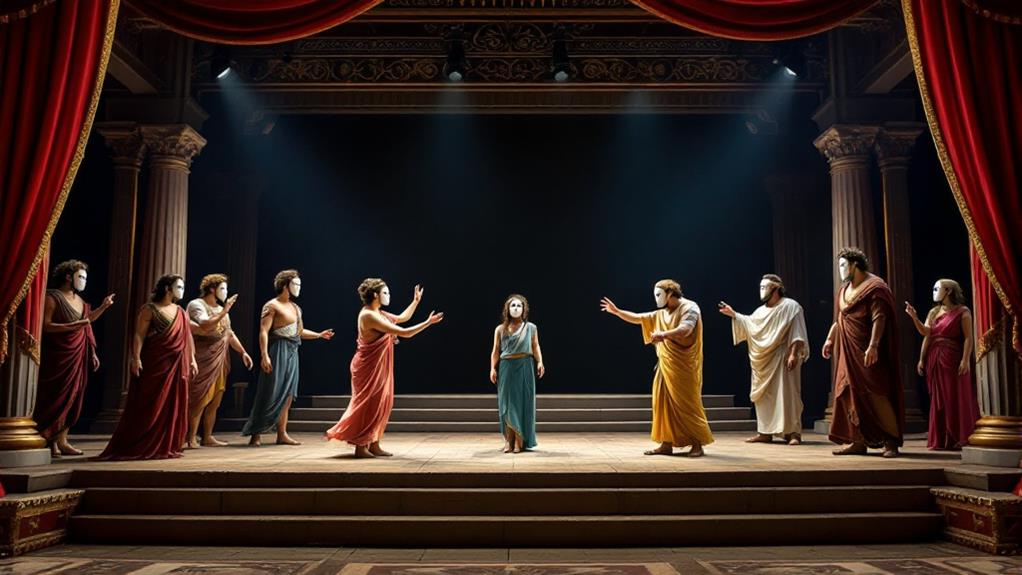
During the shift from 404-336 BCE, Middle Comedy emerged as a bridge between Old and New Comedy. This transitional period marked a significant change in Greek comedic theater, moving away from the overt political satire that characterized Old Comedy.
In Middle Comedy, you'll notice a shift towards stories focused on contemporary life and society. The role of the chorus, which was prominent in Old Comedy, was reduced, making way for an increased emphasis on stock character types. This change paved the path for the more character-driven and socially-focused New Comedy that would follow.
While few complete plays from this period survive, you can still investigate Middle Comedy through Aristophanes' later works, such as "Assembly Women" and "Plutus." Additionally, fragments from other playwrights like Alexis, Antiphanes, and Eubulus offer glimpses into this changing comedic style.
Middle Comedy represents a vital evolution in Greek theater, blending elements of its predecessor while introducing new themes and structures that would influence future comedic works. It's a fascinating period that showcases the fluid nature of Greek comedy and its ability to adapt to changing societal norms.
New Comedy: Everyday Life
As Greek comedy evolved, New Comedy emerged as a distinct style focused on everyday life and relatable characters. You'll find that these plays centered around domestic stories featuring middle-class individuals, rather than political figures or specific people. The comedies investigated themes like romance, financial troubles, and relationship dynamics between family members and neighbors.
Unlike its predecessors, New Comedy put a stronger emphasis on character development and portrayed the humor of ordinary life. You'd see playwrights like Menander crafting stories that reaffirmed prevailing social values instead of challenging them. This approach made the plays more accessible and relatable to audiences.
To resolve plot complications, New Comedy incorporated techniques such as the ex machina twist. This device allowed for satisfying resolutions to the various predicaments faced by characters. As you watch or read these plays, you'll notice how they capture the essence of everyday life, with all its ups and downs. The focus on ordinary situations and middle-class characters made New Comedy a reflection of society's values and concerns during that period.
Famous Greek Comedy Playwrights
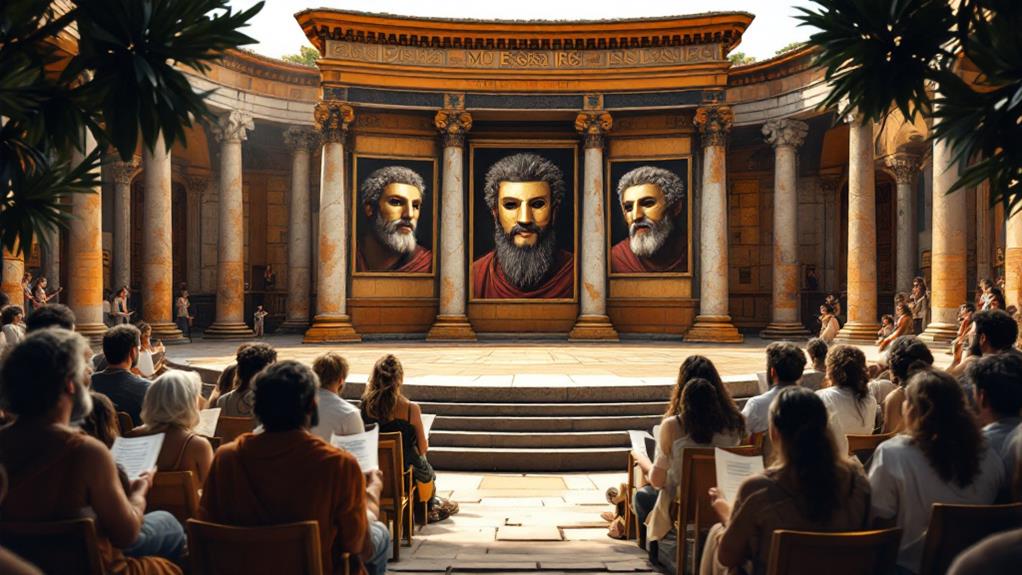
The evolution of Greek comedy was shaped by a handful of brilliant playwrights who left an unforgettable, enduring, or lasting mark on the art form. In Old Comedy, you'll find Aristophanes, the most renowned Greek comedian of the Classical period. His satirical plays boldly criticized political figures and social trends, setting the standard for biting humor.
As comedy developed, playwrights like Alexis, Antiphanes, and Eubulus ushered in the Middle Comedy era. They shifted focus from political satire to stories about contemporary life, forging the way for New Comedy.
In New Comedy, you'll encounter Menander, who pioneered the genre with his focus on domestic themes, romance, and character development. Alongside him, Philemon and Diphilus investigated universal human experiences and moral lessons, making their works relatable to audiences across generations.
It's worth noting that Greek comedy wasn't always lighthearted. Early playwrights like Pratinas and Aeschylus created the satyr play, a bawdy and ribald counterpart to tragic dramas. These various styles and playwrights collectively shaped the rich fabric of Greek comedy.
Theatrical Elements and Staging
Ancient Greek comedies were brought to life through a variety of unique theatrical elements and staging techniques. You'd have experienced these performances in outdoor theaters with tiered seating, allowing for excellent visibility and acoustics. As you watched, you'd notice the actors wearing distinctive masks that conveyed their characters' age, gender, and social status, helping you quickly identify and understand each role.
The staging itself was minimal, with little to no scenery. This simplicity encouraged you to use your imagination to fill in the details of the setting. Greek comedies were often presented alongside tragedies and satyr plays during religious festivals, forming an integral part of Greek cultural and religious life.
These theatrical elements combined to create a rich and immersive experience. You'd find yourself surrounded by fellow citizens, all gathered to enjoy performances funded by wealthy patrons. The outdoor setting, the use of masks, and the minimal scenery all worked together to transport you into the world of the play, making Greek comedies a truly unique and engaging form of entertainment.
Masks and Costumes
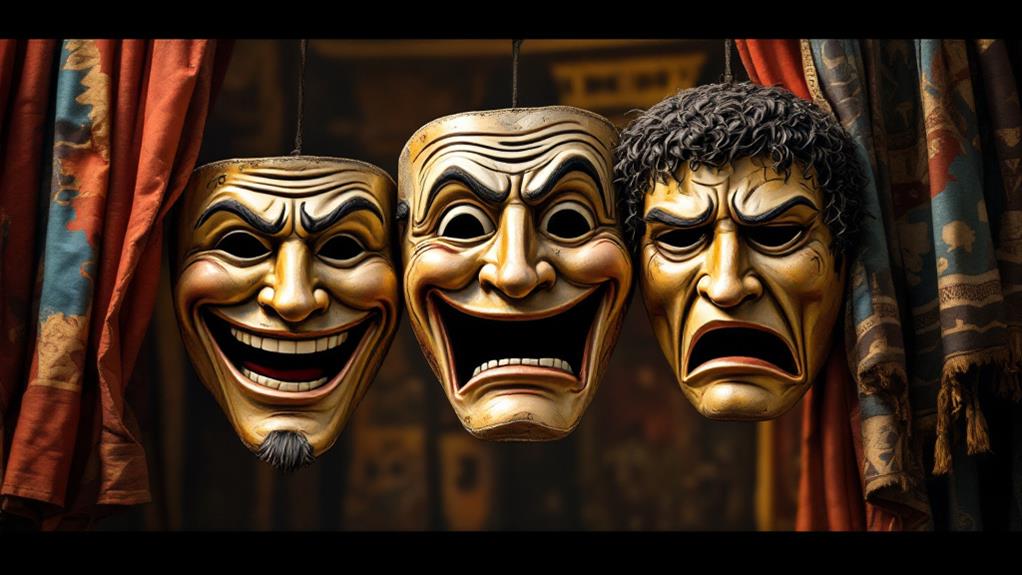
When you attended a Greek comedy performance, you'd immediately notice the striking masks and costumes worn by the actors. These essential elements allowed performers to bring a wide range of characters to life on stage. The masks were designed to exaggerate physical features, featuring large noses, wide mouths, and distorted expressions to heighten the humorous effect of the production.
You'd see actors donning equally exaggerated costumes, complete with padded bodysuits, brightly colored garments, and outlandish headdresses. This combination of masks and costumes enabled performers to shift quickly between multiple roles during a single show, keeping you engaged and entertained throughout the performance.
The highly stylized nature of these theatrical elements served a vital purpose beyond just visual appeal. They helped distinguish comedy from its more serious counterpart, tragedy, creating a clear visual contrast between the two genres. As you watched the actors move about the stage in their elaborate getups, you'd be immersed in a world of laughter and absurdity, brought to life through the clever use of masks and costumes.
Chorus in Greek Comedy
As you plunge into Greek comedy, you'll find that the chorus played an essential role in these performances. Originating from ritual and other theories, the chorus was a key element of comic theatre, particularly during the City Dionysia festival. In Old Comedy, exemplified by Aristophanes, you'd encounter large choruses of up to 24 members, dressed in elaborate costumes and masks.
The chorus wasn't just a background element; they were active participants in the comedy genre. You'd see them interacting with the protagonists, offering commentary, and providing their viewpoints on the unfolding events. Their choral odes and songs punctuated the action, creating a shared experience for the audience and enhancing the representation of laughable people on stage.
As Greek comedy evolved from Old Comedy through Middle Comedy to New Comedy, you'd notice the chorus's role changing. In Old Comedy, they were central to the performance, but their prominence gradually diminished. By the time of New Comedy, you'd find the chorus playing a much smaller part in the overall structure of the plays.
Themes and Social Commentary
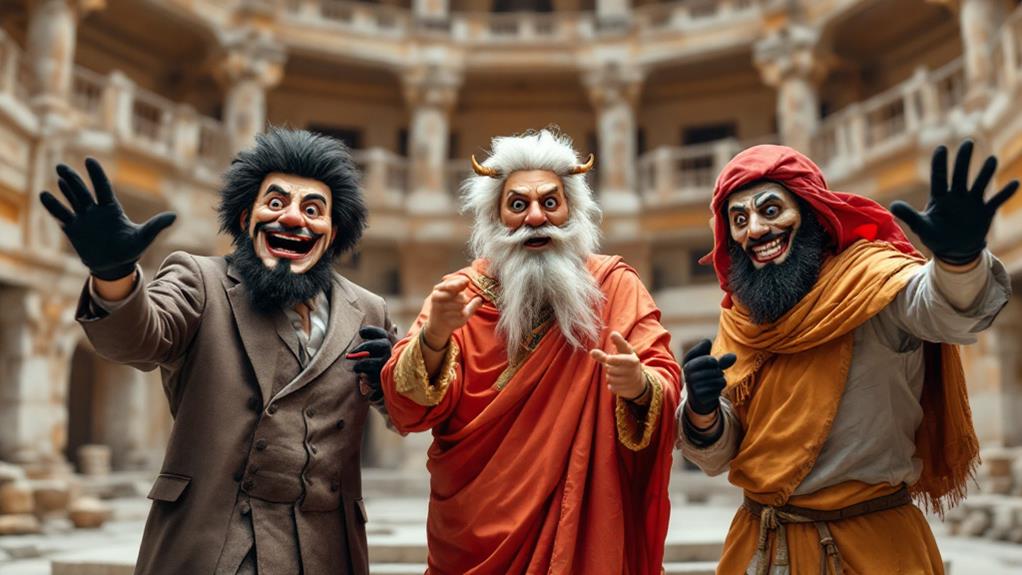
While Greek comedies entertained audiences with laughter and wit, they also served as powerful vehicles for social and political commentary. Throughout the three distinct periods of Greek comedy, you'll notice a shift in how playwrights approached these themes.
Old Comedy, exemplified by Aristophanes' works, was known for its biting political satire. You'd find direct criticisms of Athenian society and political figures, often using exaggeration and parody to drive home their points. As theater evolved into Middle Comedy, you'll see a move away from overt political commentary. Instead, playwrights focused on more generic depictions of contemporary life and introduced stock characters to represent societal archetypes.
New Comedy further distanced itself from politics, turning its attention to domestic stories and romance. However, don't be fooled by this apparent shift. Even as the subject matter changed, Greek comedies consistently offered a platform for social commentary and the subversion of established norms. Through each period, you'll find that comedy remained a powerful tool for exploring universal human experiences and challenging societal expectations.
Legacy of Greek Comedy
The legacy of Greek comedy extends far beyond the ancient world, shaping the course of Western drama and theater for centuries to come. From Old Comedy to Middle Comedy and New Comedy, these ancient Greek forms have left an indelible mark on the way we approach humor and social commentary in literature and performance.
You'll find that comedy almost certainly developed from earlier traditions, but it's the preserved texts from Ancient Greece that provide us with invaluable insights into their society. As you investigate the works of Aristophanes and Menander, you'll uncover themes and techniques that continue to resonate in contemporary theater. The satirical edge of Old and Middle Comedy survives today largely through adaptations and reinterpretations, while New Comedy subsequently influenced later Roman and European comedic styles.
Scholarly debates and modern productions keep Greek comedy alive, offering fresh viewpoints on these timeless works. By studying these ancient texts, you're not just learning about the past; you're gaining a deeper understanding of how comedy has evolved and continues to shape our cultural landscape.



